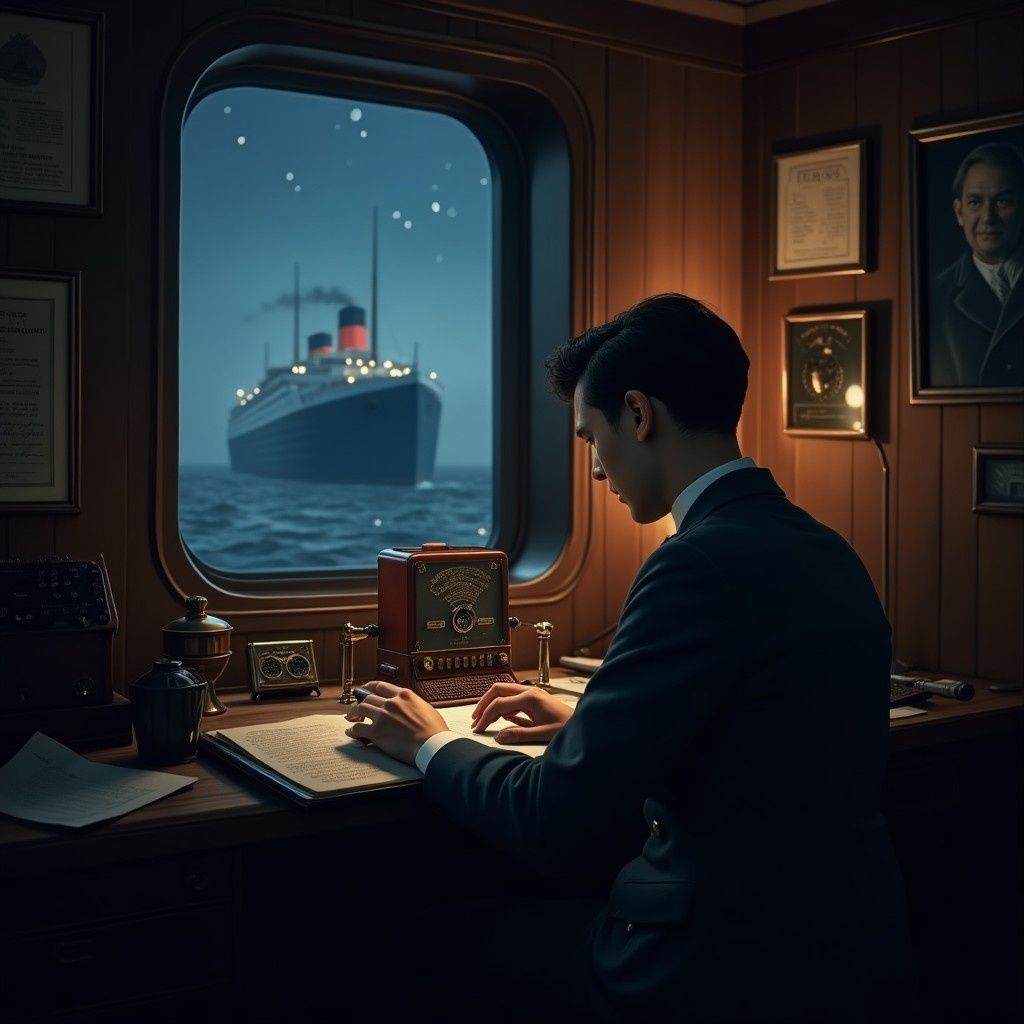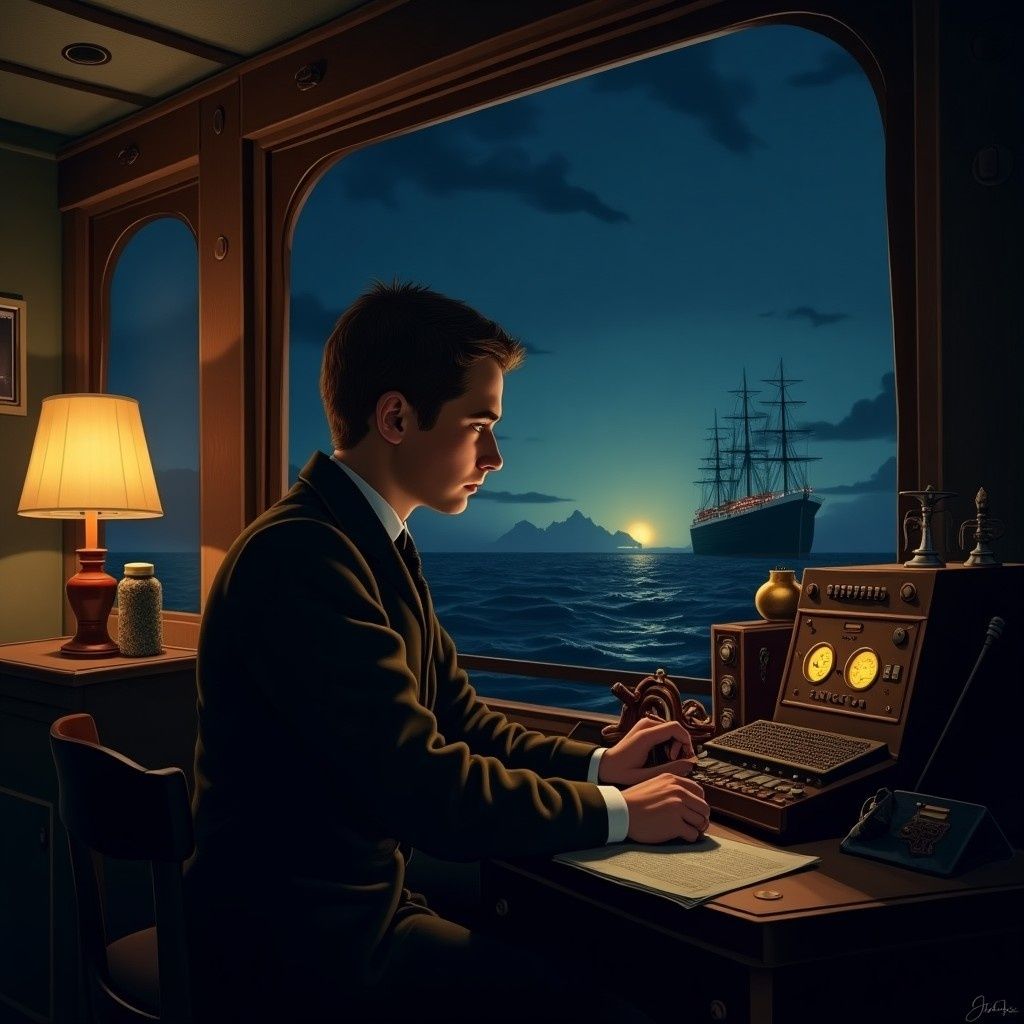**Title: Echoes of the Ether**
The wireless room of the RMS Republic hummed with a quiet urgency, a symphony of static and soft Morse code tapping. Jack Thompson, a young and ambitious radio operator, sat hunched over the Marconi set, his fingers dancing across the keys.

It was 1909, and the world was on the cusp of change, though Jack could hardly know how profound that change would be. The night was still, the sea a vast, dark expanse stretching infinitely beyond the ship's hull. Jack's mind wandered as he worked, thoughts drifting to his fiancée, Mary, waiting for him back in Liverpool. Her letters, filled with dreams of their future, were tucked safely in his pocket, a talisman against the loneliness of the ocean. Suddenly, the calm was shattered by a jarring jolt, the ship shuddering violently beneath him. Jack's heart leapt into his throat as he steadied himself, eyes wide with disbelief.

The Republic had collided with another vessel, the Italian liner Florida, and chaos erupted on deck. His training kicked in, and Jack sprang into action, his hands flying over the keys. "CQD...CQD...CQD..." The distress signal crackled into the ether, a desperate plea for help. Each tap was a heartbeat, a lifeline cast into the void, and Jack poured his soul into the rhythm, willing the message to reach the ears of those who could save them. As the minutes stretched into eternity, Jack felt the weight of the world pressing down on him. The room was a cacophony of voices, officers barking orders, passengers' cries echoing through the corridors. Yet amidst the chaos, Jack remained a steadfast beacon, his focus unyielding. Hours passed, and the Republic's fate hung in the balance. Jack's fingers ached, his eyes burned, but he continued to send the signal, a relentless mantra of hope. Finally, a response crackled through the static, a ship had heard their call. Relief washed over him, a tide of emotion that left him breathless.

In the aftermath, as the Republic's passengers were safely transferred to the Florida, Jack stood on the deck, the cold wind biting at his skin. He watched the horizon, the dawn breaking in brilliant hues of orange and gold, a promise of new beginnings. The incident with the Republic became a pivotal moment in maritime history, a catalyst for change. Jack's use of CQD had been instrumental in the rescue, but it was clear that a more distinct signal was needed. The transition to SOS, with its unmistakable simplicity, soon followed, a testament to the lessons learned that fateful night. Years later, Jack would recount the story to his children, his voice filled with the same passion and urgency that had driven him in those critical hours. He spoke of the power of communication, the bonds forged in adversity, and the unyielding spirit of those who refused to surrender to the sea. As he told his tale, Mary would listen with a knowing smile, her hand resting gently on his. Together, they had weathered many storms, their love a constant beacon in a world of uncertainty. And though the echoes of the ether had long since faded, the legacy of that night lived on, a reminder of the courage and resilience that defined the human spirit.

It was 1909, and the world was on the cusp of change, though Jack could hardly know how profound that change would be. The night was still, the sea a vast, dark expanse stretching infinitely beyond the ship's hull. Jack's mind wandered as he worked, thoughts drifting to his fiancée, Mary, waiting for him back in Liverpool. Her letters, filled with dreams of their future, were tucked safely in his pocket, a talisman against the loneliness of the ocean. Suddenly, the calm was shattered by a jarring jolt, the ship shuddering violently beneath him. Jack's heart leapt into his throat as he steadied himself, eyes wide with disbelief.

The Republic had collided with another vessel, the Italian liner Florida, and chaos erupted on deck. His training kicked in, and Jack sprang into action, his hands flying over the keys. "CQD...CQD...CQD..." The distress signal crackled into the ether, a desperate plea for help. Each tap was a heartbeat, a lifeline cast into the void, and Jack poured his soul into the rhythm, willing the message to reach the ears of those who could save them. As the minutes stretched into eternity, Jack felt the weight of the world pressing down on him. The room was a cacophony of voices, officers barking orders, passengers' cries echoing through the corridors. Yet amidst the chaos, Jack remained a steadfast beacon, his focus unyielding. Hours passed, and the Republic's fate hung in the balance. Jack's fingers ached, his eyes burned, but he continued to send the signal, a relentless mantra of hope. Finally, a response crackled through the static, a ship had heard their call. Relief washed over him, a tide of emotion that left him breathless.

In the aftermath, as the Republic's passengers were safely transferred to the Florida, Jack stood on the deck, the cold wind biting at his skin. He watched the horizon, the dawn breaking in brilliant hues of orange and gold, a promise of new beginnings. The incident with the Republic became a pivotal moment in maritime history, a catalyst for change. Jack's use of CQD had been instrumental in the rescue, but it was clear that a more distinct signal was needed. The transition to SOS, with its unmistakable simplicity, soon followed, a testament to the lessons learned that fateful night. Years later, Jack would recount the story to his children, his voice filled with the same passion and urgency that had driven him in those critical hours. He spoke of the power of communication, the bonds forged in adversity, and the unyielding spirit of those who refused to surrender to the sea. As he told his tale, Mary would listen with a knowing smile, her hand resting gently on his. Together, they had weathered many storms, their love a constant beacon in a world of uncertainty. And though the echoes of the ether had long since faded, the legacy of that night lived on, a reminder of the courage and resilience that defined the human spirit.
CQD, one of the first radio distress signals, was introduced by the Marconi International Marine Communication Company in 1904, derived from the telegraph code "CQ" for general calls, with "D" added to signify distress. Despite its initial use, CQD was never standardized internationally due to its potential confusion with general calls. The more distinctive SOS signal, adopted at the 1906 International Radiotelegraphic Convention, replaced CQD due to its clarity and ease of recognition. Notably, CQD was used during the RMS Republic collision in 1909 and initially by the RMS Titanic in 1912 before switching to SOS. The transition from CQD to SOS marked a significant advancement in maritime safety communications.


Comments
Post a Comment